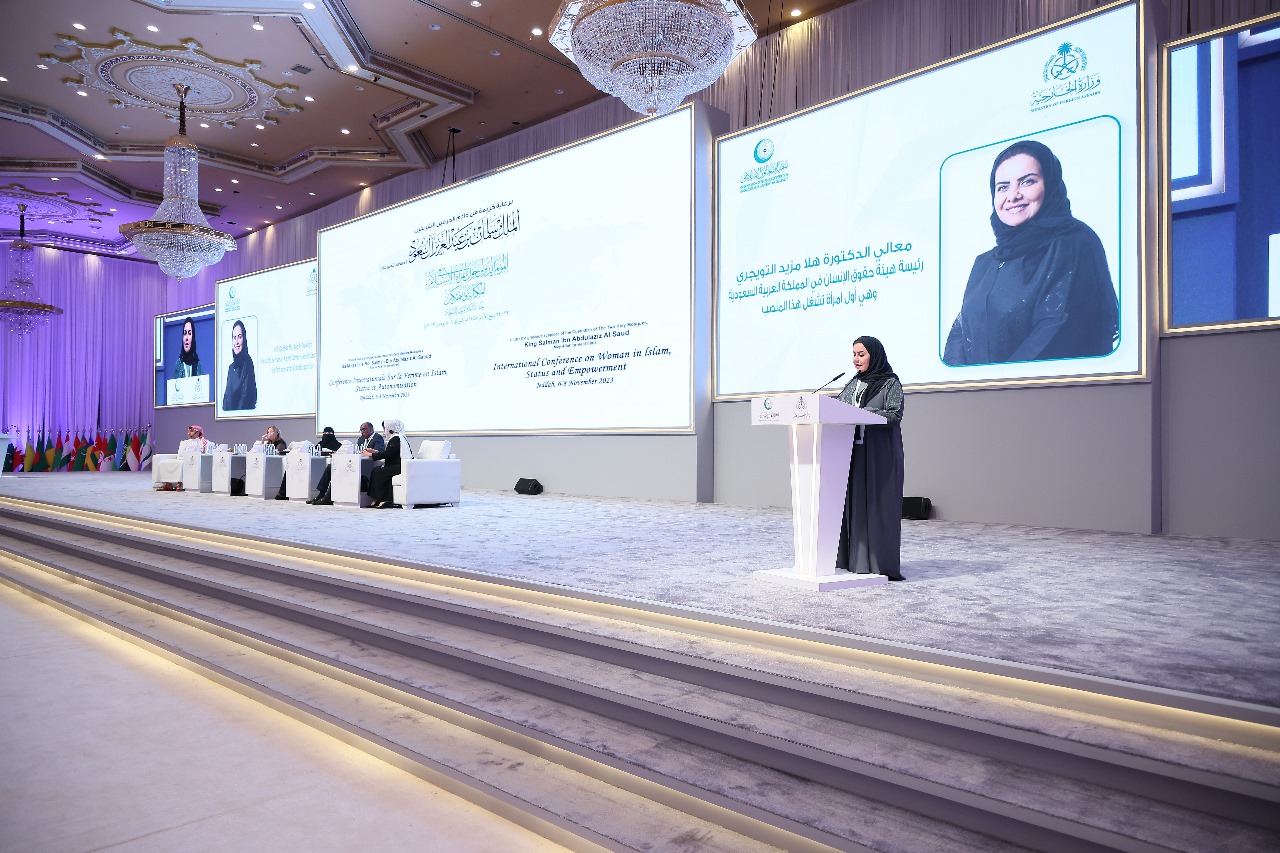
International Conference on Women in Islam discusses empowering muslim women in contemporary societies
text_fieldsJeddah: On its third and final day, the International Conference on Women in Islam (Status and Empowerment), organized by the General Secretariat of the Organization of Islamic Cooperation (OIC) and hosted by the Kingdom of Saudi Arabia in Jeddah, discussed ways and methods to empower Muslim women in contemporary societies.
The third day's sessions began with the third working session titled "Muslim Women in the Gulf, Arab, and Islamic Framework."
During the session, Dr Hala bint Mazyad Al-Tuwaijri, President of the Human Rights Commission in the Kingdom of Saudi Arabia, discussed the role of human rights institutions and their national bodies in combating discrimination against women in legislation and applications.
She explained that women's rights have witnessed significant developments globally over the past two centuries due to the Industrial Revolution and major societal transformations.
"These developments led to establishing international and local human rights organizations advocating for women's rights in particular."
Al-Tuwaijri highlighted the efforts of the Human Rights Commission in the Kingdom of Saudi Arabia as a model of human rights institutions supporting the rights of Muslim women in Islamic countries.
In her remarks, Sharon Slater, the Co-founder and current President of Family Watch International, warned that over the past two decades, there have been shifts in the interpretation of UN treaties, leading to questions about their impact on human rights, particularly how they affect women, children, and the family institution.
She pointed out that under different slogans, such as preventing teenage pregnancies and gender-based violence, some international organizations are promoting a form of sexual education that has received criticism for raising sensitive issues with children before they reach an appropriate age.
Dr. Noura bint Zaid Al-Rashoud, Executive Director of the OIC Independent Permanent Human Rights Commission, stated that women had gained many of their rights globally after deep reviews of their rights in many societies. This progress occurred through updating and reviewing policies and legislation in most countries worldwide during the past few decades.
She explained that these reviews varied from one country to another, with some focusing solely on legal and official equality while ignoring the psychological and physical differences between men and women, as well as ignoring traditional religious and social values. Others attempted to balance the requirements of modernity with the prevailing social and religious values.
Al-Rashoud highlighted the IPHRC's efforts in protecting women from all forms of discrimination, violence, and mistreatment, as well as presenting the human rights perspective on women's rights issues in the context of family, marriage, and times of conflict.
OIC Assistant Secretary-General for Humanitarian, Cultural, and Social Affairs, Ambassador Tariq Ali Bakheet, discussed the presence of women in the OIC's resolutions, emphasizing that the OIC considers the issues of Muslim women among its top priorities.
The head of the National Committee for Population Development in Tajikistan, Khairinisso Yusufi, highlighted the urgency of aligning international conventions related to women's rights with local laws and regulations in the Islamic world.
She stressed that achieving this balance is of utmost importance to ensure respect for women's rights without undermining the cultural and religious values of predominantly Muslim countries.
During the fourth working session, "Muslim Women in Contemporary Societies: Opportunities and Challenges," Hina Rabbani Khar, former Minister for Foreign Affairs in Pakistan, discussed the presence of Muslim women in the diplomatic field.
She outlined some of the opportunities and challenges faced by Muslim women aspiring to engage in diplomatic work actively.
The former Pakistan's top diplomat explained that the participation of Muslim women in diplomacy has been historically limited, but gradual change is underway as more Muslim women seek employment in the diplomatic and international relations fields.
Zehra Zümrüt SELÇUK, the Director-General of the Statistical, Economic, and Social Research and Training Centre for Islamic Countries (SESRIC), addressed the issue of women's participation in economic and public life in the OIC member states, using the latest available data and statistics.
She confirmed that many OIC countries have made significant progress in developing policies and national programs to empower women. These efforts prioritize women's rights to education, access to decent employment opportunities, access to various services and resources, and participation in decision-making.
Dr. Haifa Jamal Al-Lail, the President of Effat University in Saudi Arabia, emphasized the role of education as a crucial aspect of the contemporary Muslim woman's life.
She affirmed that Islam places great importance on educating and enlightening women and stressed that education is firmly established as one of the rights guaranteed to women by Islamic law.
"Despite the recognition in societies of the importance of women's participation in development to uplift their communities, reports on women's issues and the need for their advancement and empowerment still reflect the challenges women face," Dr. Haifa said, stressing the importance of educating women as a fundamental tool for their empowerment.
The Professor of Mass Communication at the University of Ilorin, Nigeria, emphasized that the media is an indispensable tool for shaping and changing human behaviour and individuals' perceptions of others.
She stressed the need to confront the stereotypical images that influence the portrayal of Muslim women and their visibility in the media.
The human rights activist and former president of the Afghan Red Crescent Society, Fatima Gailani, said that balancing deeply rooted domestic traditions and Islamic principles poses a complex challenge, especially in countries like Afghanistan.
"In cases like the current issue regarding women's education and work in Afghanistan, it is evident that this matter is not fundamentally rooted in Islam. It contradicts the general and comprehensive Quranic directive "Iqra" (read) that applies to all members of society," she added, calling on prominent scholars in the Islamic world to play a pivotal role in liberating women from this invisible confinement.
During the fifth and final working session, "Prospects for Empowering Muslim Women in Education and Work," the Special Representative of the UN Secretary-General in Afghanistan, Rosa Otunbayeva, explained that the United Nations plays a pivotal role in advocating for gender equality and women's empowerment, particularly in the realms of education and work.
She reaffirmed that the UN consistently promotes comprehensive and equitable education and emphasized the need to eliminate gender disparities in access to education.
Dr. Maimunah Al Khalil, the Secretary-General of the Family Affairs Council in Saudi Arabia, addressed the "Legislative Requirements for Empowering Women in Education and Work."
She stated that empowering women in education and employment is a critical focus in international efforts for women's empowerment.
"Education equips them with skills in communication, openness, and positive contribution, arming them with knowledge. Employment allows them to practice this knowledge and utilize the skills they have acquired throughout their learning journey."
She urged those interested in women's empowerment in Islamic countries to consider specific legislative requirements during the legal and rights review of women's laws, offering a practical model for these requirements based on Saudi Arabia's experience. The Saudi government and its specialized agencies conducted comprehensive reviews of women's laws in line with Vision 2030, which places significant importance on women.
On her part, the Executive Director of the National Office for Women Bureau in the Republic of The Gambia, Binta Jamm Sidibe, emphasized the OIC's commitment to international legal frameworks that promote the rights of all women, including Muslim women, in areas such as education and employment.
The conference concluded on Wednesday after three days, featuring five working sessions in which ministers, officials, thinkers, and scholars discuss various issues related to women and their empowerment in the Islamic world.























